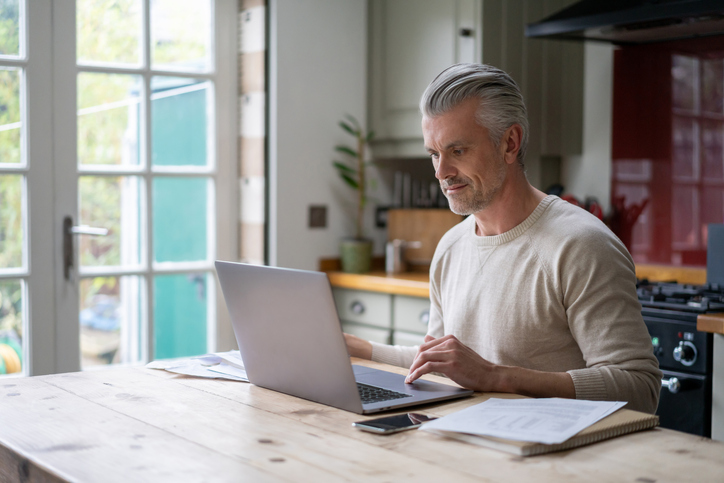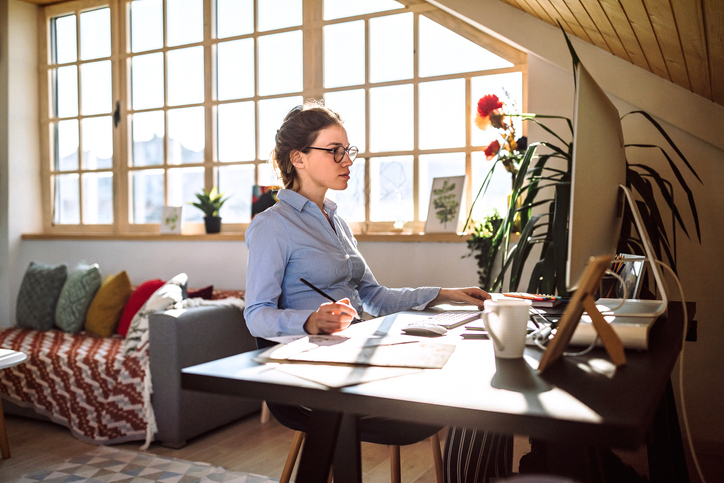Working from home is here to stay for the foreseeable future. Until restrictions are lifted home working remains the default and may even continue for some beyond the pandemic on a full or part-time basis.
If you’ve not managed to adapt to homeworking yet, you’re not alone. Levels of stress, anxiety and depression have risen across the country with some people citing that they feel more stressed working from home than they did in the office.
Whilst you eagerly wait to get back to the office when restrictions lift, there are some simple things you can do to make working from home a bit less stressful in the meantime.
Let in some light
Sunlight is scientifically proven to make you happier; it triggers your brain to release serotonin which boosts your mood, reduces anxiety levels and is key to helping you feel calmer and more focused. We know that we’re not exactly blessed with an abundance of sunlight, in this country, but there are a few things you can do to make sure your workspace gets a bit more of it.
If you can, try to have your desk near to a window and draw back the curtains or blinds fully to let in as much light as possible. Upstairs rooms always capture more sunlight but if you live in a lower flat or can’t work upstairs, you can use mirrors to reflect the light around the room.
Block out noise
Throughout the day, your brain is constantly working to recognise and pick up on changes in the sounds you hear which, as you can imagine, can be very distracting. Repeated sharp sounds can even affect your blood pressure as they trigger the parts of your brain that control your ‘fight or flight’ response.
Blocking out noise at home can be difficult and is often out of our control but if you find your concentration is affected by noise it might be worth using earplugs or noise-cancelling headphones at times when you need to be able to focus. Working in a room with carpet and lots of soft furnishings can also help absorb sound.
Clean away your clutter
Studies have shown that having clutter around you can raise your levels of the stress hormone cortisol as it can overstimulate the brain. A lot of clutter in your home might not have bothered you in the evenings and weekend when you’ve left work mode, but now that your workspace is at home it might be time to have a clear up.
Think about what you need close to hand in order to do your job like pens, notepads and post-its and clear everything else away from where you’re working. Desk storage can be helpful to organise the things you do need so that they’re handy but not getting in your way.
Don’t spend all day sitting down
If you’re not going to work, then chances are you’re getting less exercise than you normally would. It might not seem like a lot but walking to the train station, going out for a sandwich or a coffee, or popping to the shops on your lunch break can add up to a significant amount of walking in a week.
Exercise doesn’t just keep us physically fit; it also has an impact on your mental wellbeing. It’s one of the best stress-busting activities as it will release endorphins which boost your physical and mental energy.
You don’t need to turn into a Joe Wicks fitness buff but try to make a concentrated effort to fit some exercise into your day. Going for a walk at lunch will help clear your head or even just stepping away from your desk every hour or so and walking around indoors for a few minutes can help perk you up. If you have a fitness tracker or a smartwatch you can set reminders to prompt you to get away from your desk.
Add some greenery to your workspace
We often associate nature with relaxation so adding a plant or some flowers to your workspace can have a significant impact on your mood. Studies have shown that contact with the natural world can reduce blood pressure, anxiety and stress while improving your attention, memory and sleep patterns.
If you do decide to invest in a pot plant or two, just remember to water it – you don’t want to have to live with the guilt of letting it wither away!
Search the latest jobs at [site_name].



